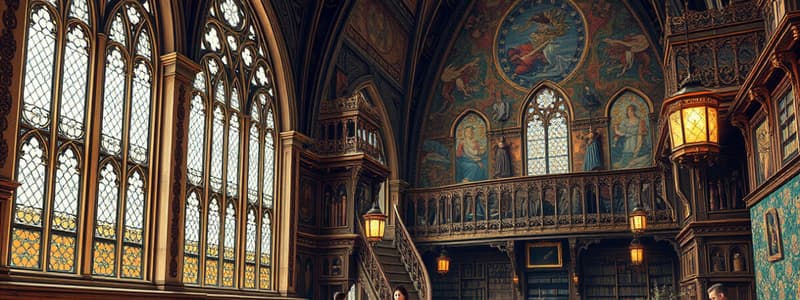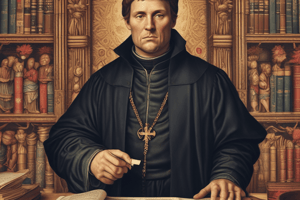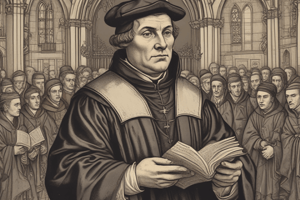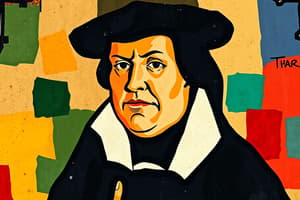Podcast
Questions and Answers
What were indulgences in the 16th century?
What were indulgences in the 16th century?
- Tax exemptions for the wealthy
- Donations to the church for charity
- Payments made to reduce time in purgatory (correct)
- Free passes for church services
Who started Lutheranism?
Who started Lutheranism?
Martin Luther
Tetzel sold indulgences to raise money for the construction of the Vatican.
Tetzel sold indulgences to raise money for the construction of the Vatican.
False (B)
What is Lutheranism based on?
What is Lutheranism based on?
What was the Edict of Worms?
What was the Edict of Worms?
What did the Peace of Augsburg establish?
What did the Peace of Augsburg establish?
Who was the leader of the Swiss Reformation?
Who was the leader of the Swiss Reformation?
Match the following people with their contributions:
Match the following people with their contributions:
Henry VIII created the Anglican Church because he wanted to reform church practices.
Henry VIII created the Anglican Church because he wanted to reform church practices.
What did the Jesuits focus on?
What did the Jesuits focus on?
What was the Diet of Worms?
What was the Diet of Worms?
The Bartholomew's Day Massacre killed an estimated 10,000 Huguenots.
The Bartholomew's Day Massacre killed an estimated 10,000 Huguenots.
What is predestination in Calvinism?
What is predestination in Calvinism?
What was the significance of the Council of Trent?
What was the significance of the Council of Trent?
Flashcards are hidden until you start studying
Study Notes
Church in the 16th Century
- Papacy and parish priests faced corruption with financial misconduct.
- Indulgences sold by the church promised relief from purgatory, financing projects like cathedrals.
- Salvation was believed to depend on a combination of good works and faith.
Martin Luther
- A Northern German priest who challenged the sale of indulgences.
- Authored the 95 Theses in 1519, initiating the Protestant Reformation.
- His followers identified as Lutherans, promoting principles of faith alone and scripture as the sole authority.
Tetzel
- Known for selling indulgences to raise funds for the church.
Lutheranism
- Founded by Martin Luther, characterized by beliefs in faith (sola fide) and scripture.
- Recognizes only two sacraments: Holy Communion and Baptism.
- Predominantly established in Germany, Sweden, Norway, and Denmark.
The Edict of Worms
- Issued by Holy Roman Emperor Charles V, declaring Luther a heretic.
- Forbade the defense of Luther's works, labeling him a threat to the state.
Diet of Worms 1521
- An assembly in Worms, Germany, to discuss Luther's ideas with the church.
- Luther was declared a heretic and almost executed, but was rescued by German princes.
The German Peasant Revolt
- Occurred in 1525 as peasants sought to dismantle social and religious hierarchies.
- Misunderstood Luther's support; the revolt was suppressed by nobles, diminishing Luther's popularity.
Peace of Augsburg
- Established the principle of "cuius regio, eius religio," meaning the prince's religion determines that of his subjects.
The Zwinglian Reformation
- Led by Ulrich Zwingli; emphasized a theocratic government where church and state were intertwined.
- Interpreted the Bible literally.
Zwingli
- Key figure in the Swiss Reformation advocating for a theocratic state.
John Calvin
- Founded Calvinism in Geneva and emphasized predestination.
Calvinism
- Followers, known as Calvinists, adhered to strict moral codes, prohibiting dancing, gambling, and bright colors.
Huguenots
- The term for French Calvinists who faced persecution.
Presbyterian
- Founded by John Knox in Switzerland; based on Calvinist principles, establishing a church governance system.
Henry VIII
- King who sought to divorce his wives but was blocked by Catholic doctrine.
- Established the Anglican Church, positioning himself as its head.
Anglican Church
- Similar to Catholicism but without papal authority; governed by the king.
Pilgrimage of Grace
- A protest against Henry VIII's establishment of the Anglican Church.
Anabaptists
- Radical reformers rejecting infant baptism and advocating for church-state separation.
The War of the Three Henrys
- Conflict in France involving Henry of Guise, Henry II, and Henry of Navarre (Bourbon).
- Resulted in Henry of Navarre's victory, leading to his ascension as king.
Edict of Nantes
- Issued in 1589, granting rights and freedoms to Huguenots in France under Henry IV.
Politiques
- A pragmatic approach prioritizing political stability over religious identity.
St. Bartholomew's Day Massacre
- A violent event preceding the marriage of Catherine de' Medici’s daughter and Henry of Navarre, resulting in the deaths of 10,000-15,000 Huguenots over four days.
Council of Trent
- Convened by Pope Paul III to address church abuses and reform practices, leading to the establishment of new orders like the Jesuits.
Jesuits
- Founded by Ignatius Loyola, dedicated to spreading Catholicism globally through missionary work.
The Dutch Revolt
- Resistance against Philip II of Spain's rule in the Netherlands, marked by the violent suppression led by the Duke of Alva.
- Eventually led by William of Orange, resulting in eventual independence for the Netherlands after years of conflict.
Studying That Suits You
Use AI to generate personalized quizzes and flashcards to suit your learning preferences.




